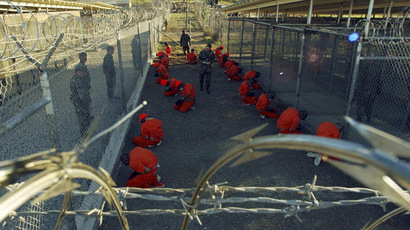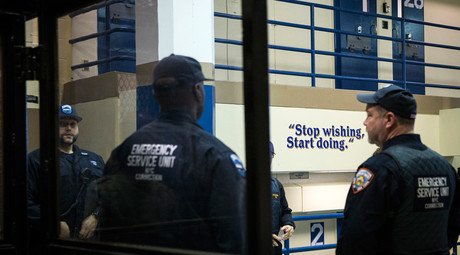Solitary-confinement survivor arrested by NYPD after friend filmed police

A man named Five Omar Mualimm-ak, who remained in solitary confinement for five years, was arrested by New York police after a book-launch event where he spoke. He was detained for protesting the arrest of a fellow activist after he had filmed the police.
Mualimm-ak spoke at a launch event on Tuesday night for the book Hell Is a Very Small Place: Voices from Solitary Confinement, for which he was a contributor. He was released from prison in 2012 after spending 12 years behind bars, five of them in solitary confinement, for illegal weapons possession. He went on to found the Incarcerated Nation Corporation, which assists former prisoners.
BREAKING NEWS: Activist and Author Five Mualimm-ak Arrested by NYPD Following Book… https://t.co/8NB7YZo45Kpic.twitter.com/jfDacRIIIq
— Solitary Watch (@solitarywatch) March 16, 2016
Following the event, held at the Open Society Foundations in on West 57th Street in Manhattan, Mualimm-ak and fellow activist Joseph "Jazz" Hayden were leaving the building and found New York Police Department officers harassing a homeless man. Hayden filmed he encounter and was eventually arrested, SolitaryWatch.com reported, citing eyewitnesses. Mualimm-ak protested Hayden's arrest, getting himself arrested in the process.
Mualimm-ak and Hayden were taken to the Midtown North Precinct. Five people who attended the book event followed them there, only to be arrested themselves. They were charged with "refusal to disperse" and released, SolitaryWatch.com reported.
Prison activists Five Mualimm-ak & Joseph Jazz Hayden just taken away by NYPD. Photo of Mualimm taken an hour ago. pic.twitter.com/6d2sAElHUA
— Amanda Aronczyk (@aronczyk) March 16, 2016
The two men were charged with obstruction of government administration and are expected to be arraigned on Wednesday afternoon in New York County Criminal Court.
Mualimm-ak has written that he garnered more than 2,000 days in solitary confinement for racking up "tickets" for minor infractions like refusing to eat an apple at lunch or for pulling his arm away from a rough medical orderly, for which he earned a write-up for "refusing medical attention."
"The very essence of life, I came to learn during those seemingly endless days, is human contact, and the affirmation of existence that comes with it. Losing that contact, you lose your sense of identity. You become nothing," he wrote for the Guardian in 2013.
"Everyone knows that prison is supposed to take away your freedom. But solitary doesn't just confine your body; it kills your soul."
37yrs solitary for using #Facebook: S. Carolina inmates face harsh penalties for social media http://t.co/ase1stZMrgpic.twitter.com/H7U82rHE0z
— RT America (@RT_America) February 14, 2015
Human Rights Watch recently issued a report excoriating the US prison system for the estimated 100,000 prisoners in state and federal facilities who are kept in solitary confinement. The group said isolation policies often track closely with an inmate's income level.
In January, President Barack Obama banned solitary confinement for juvenile inmates, and promised more time outside for older prisoners kept in isolation. Solitary confinement “has been linked to depression, alienation, withdrawal, a reduced ability to interact with others and the potential for violent behavior,” Obama wrote in a Washington Post Op-Ed.
Last year, the president asked the Department of Justice to review the “the overuse of solitary confinement across American prisons.” As a result of an “extensive study,” the DOJ concluded that “this practice should be used rarely, applied fairly, and subjected to reasonable constraints.”
Chelsea Manning letters: ‘I’ve been stored away all this time without a voice’ https://t.co/O4IFeoVbNOpic.twitter.com/ehBdbdGy14
— RT UK (@RTUKnews) February 9, 2016
In September, a class-action lawsuit in California pushed the state to end indefinite solitary confinement of thousands of inmates. In December, New York, home to the notorious Rikers Island prison, agreed to overhaul the use of solitary confinement, calling it a “massive culture change.”














